Your cart is currently empty!
Tag: Digital Marketing
-
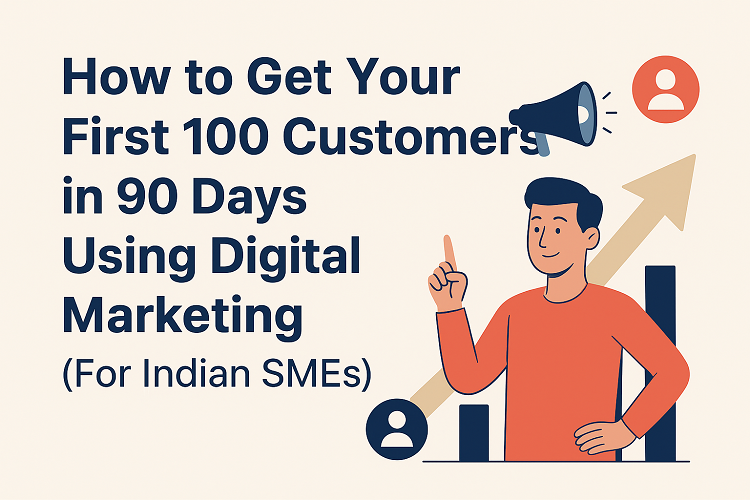
How to Get Your First 100 Customers in 90 Days Using Digital Marketing (For Indian SMEs)
For most small and medium businesses (SMEs) in India, the toughest phase isn’t scaling — it is getting started. Your product or service may be excellent, but without customers, there is no business. The good news? With the right digital marketing strategy, you can acquire your first 100 customers within 90 days, even with a limited budget.
This guide is designed specifically for Indian SMEs, local businesses, startups, service providers, retailers, and solo entrepreneurs. Let’s break your growth journey into three clear 30-day phases, each with practical action steps you can start today.
Why Digital Marketing Works for Indian SMEs
- Low-cost, high-impact brand building
- Reach customers beyond your locality
- Track results in real time
- Generate inbound leads, not just one-time sales
- Helps establish brand trust & long-term loyalty
The 90-Day Customer Acquisition Plan
Phase 1 (Days 1–30): Build Your Digital Foundation
The first month is about setting up your online presence correctly.
1. Create a Mobile-Friendly Website (Or a 1-Page Landing Page)
Most Indian customers search on mobile. Ensure your website:
✔ Loads fast
✔ Shows your business value clearly
✔ Has a Click to Call button
✔ Contains testimonialsBudget Option: Use WordPress, Wix, or Shopify (₹5,000–₹10,000 setup).
2. Optimize Your Google Business Profile
This is crucial for local visibility.
- Add business name, address, phone number
- Upload high-quality photos
- Ask early customers for reviews
- Add product/service details
Result: You’ll start appearing for searches like:
“Best tailor near me”
“Interior designer in Hyderabad”
3. Create Social Media Presence on 2 Key Platforms
Don’t try to be everywhere. Choose based on your business type:
Business Type Best Platforms Fashion / Lifestyle Instagram + Facebook IT / B2B Services LinkedIn + YouTube Coaching / Classes Instagram + YouTube Local shops / Restaurants Google + Facebook Post at least 4 times per week and use Reels/Shorts to increase reach.
Phase 2 (Days 31–60): Start Lead Generation & Engagement
Now that your foundation is set, start getting traffic and inquiries.
4. Run Small Budget Paid Ads
Start with ₹150–₹500/day.
- Facebook/Instagram Ads → For local shop & service promotions
- Google Search Ads → For high-intent leads (lawyers, real estate, doctors, agencies)
Focus on:
- Awareness ads → First 7 days
- Lead generation ads → After 7 days
Goal: Get inquiries on WhatsApp / Phone Call / Form Fill.
5. Start Content Marketing
Simple, effective formats:
- Customer testimonial post
- Before/after result
- Educational tips
- Founder story
- Behind-the-scenes work
Consistency beats creativity.
Post daily short-form content + one long-form weekly piece.
6. Build Trust Through WhatsApp Marketing
Most Indian customers convert after personal communication.
- Create a catalog / pricing PDF
- Send updates, offers, and reviews
- Use WhatsApp Broadcast Lists (not groups)
Tip: Reply fast — slow response = lost sale.
Phase 3 (Days 61–90): Convert Leads into Paying Customers
By now, you’ll have awareness + inquiries. Time to convert them.
7. Offer a Purchase Incentive
Examples:
- Free trial session
- First service discount
- Buy 1 Get 1 offer
- Free consultation
This pushes hesitant leads to take action.
8. Collect Reviews & Referral Sales
Every new customer = potential two more customers.
Ask for:
✔ Google Review
✔ Video Testimonial
✔ Referral RecommendationReward referrals with small benefits (₹100–₹500, discount, gift).
9. Retarget Warm Audience
70% of leads don’t convert immediately.
Run retargeting ads targeting:
- Website visitors
- Social media engagers
- WhatsApp leads
This can reduce cost per sale significantly.
Expected Results Over 90 Days
Metric Expected Outcome Website Visitors 3,000–8,000+ Social Followers 500–3,000+ WhatsApp Leads 200–400+ Converted Customers 100 Customers Your numbers may vary, but consistency guarantees results.
Pro Tips for Faster Growth
Tip Benefit Post daily reels Increases reach organically Answer calls & WhatsApps quickly Converts more leads Use simple language Builds trust in Indian markets Show your face on video 3× higher engagement
Final Thoughts
Getting your first 100 customers is not about luck — it is about strategy + consistency. You don’t need a big budget, a fancy office, or a huge marketing team. You just need to show up every day, provide value, and communicate clearly.
Start today. Your customers are already searching online — your business just needs to show up.
-

On-Page vs. Off-Page SEO: What’s the Difference?
On-Page vs. Off-Page SEO: What’s the Difference?
If you’re trying to improve your website’s visibility on Google, you’ve probably come across two major terms: On-Page SEO and Off-Page SEO. These are the two core components of any effective SEO strategy—and understanding the difference between them is essential to rank higher, get more traffic, and grow your business online.
In this blog, we’ll break down what on-page and off-page SEO mean, how they work, and why both are critical for your digital success.

SEO On Page and Off Page What Is SEO?
SEO stands for Search Engine Optimization, a set of techniques used to improve the ranking of your website in search engine results pages (SERPs). The goal is simple: to increase visibility, attract more organic (non-paid) traffic, and ultimately convert visitors into customers.
SEO is made up of three main categories:
On-Page SEO
Off-Page SEO
Technical SEO (which overlaps with both)
In this article, we’ll focus on the first two: On-page vs. Off-page.
What Is On-Page SEO?
On-Page SEO refers to all the actions you take within your own website to improve its visibility and relevance for search engines and users.
This includes optimizing:
Content: high-quality, keyword-rich content tailored to user intent.
HTML elements: such as title tags, meta descriptions, header tags (H1, H2, H3).
URL structure: short, keyword-focused, and clean URLs.
Internal linking: connecting related pages within your site to guide users and bots.
Images: using ALT tags and proper file sizes for speed and accessibility.
Mobile-friendliness and page speed.
Why It Matters:
On-page SEO helps search engines understand what your page is about. The better your content is structured and optimized, the more likely it will appear in relevant searches.
Key Elements of On-Page SEO
1. Title Tags & Meta Descriptions
These are the first things users see in search results. A clear, compelling title and meta description can boost click-through rates even if you’re not in the #1 spot.
2. Keyword Optimization
Using relevant keywords strategically in your content helps search engines match your page to users’ search intent.
3. High-Quality Content
Valuable, original, and informative content not only ranks well but also keeps users on your page longer (reducing bounce rate).
4. Header Tags
Organize your content with H1, H2, H3 tags. They make it easier for users to read and for search engines to understand your page structure.
5. Image Optimization
Images should be compressed for faster loading, and include ALT tags for accessibility and additional keyword relevance.
6. Internal Linking
Linking to other pages on your site improves crawlability and spreads page authority throughout your domain.
What Is Off-Page SEO?
Off-Page SEO refers to everything you do outside your website to improve its ranking. While you have less direct control here, these efforts play a crucial role in how search engines evaluate your site’s credibility and authority.
The most important aspect of off-page SEO is link building—getting backlinks from other reputable websites.
Other Off-Page SEO Factors Include:
Brand mentions
Social media signals
Guest blogging
Influencer marketing
Local citations (like directories)
Online reviews and ratings
Why It Matters:
Search engines view backlinks as votes of confidence. The more quality sites that link to your content, the more trustworthy your website appears—and the higher it can rank in SERPs.
Key Elements of Off-Page SEO
1. Backlinks
High-authority backlinks are the gold standard in SEO. Links from trusted websites pass along SEO value known as “link juice.”
2. Domain Authority (DA)
This is a metric that predicts how well your website will rank. It increases when reputable sites link to yours.
3. Social Sharing
While social media links don’t directly affect rankings, they can increase visibility and drive traffic, which can lead to more backlinks.
4. Guest Posting
Publishing articles on other websites in your niche allows you to earn backlinks and grow your audience.
5. Local SEO Signals
Things like business directory listings, Google Business Profile optimization, and customer reviews impact your off-page presence, especially for local businesses.
On-Page vs. Off-Page SEO: What’s the Real Difference?
Here’s a quick comparison to make it easier to understand:
Aspect On-Page SEO Off-Page SEO Control You have full control Limited control (depends on third parties) Focus Area Content, structure, optimization Reputation, authority, trust Key Activities Keyword usage, meta tags, content, internal linking Link building, brand mentions, social sharing Goal Make content relevant and crawlable Make site trustworthy and authoritative Examples Optimizing blog posts, adding alt text Getting backlinks from blogs or news sites
Do You Need Both On-Page and Off-Page SEO?
Absolutely.
Think of SEO like a car:
On-Page SEO is the engine, design, and features—everything inside that makes the car run smoothly.
Off-Page SEO is your reputation on the road—how people talk about your car, whether it’s trusted, and if it’s respected by others.
If your site has great on-page SEO but no backlinks or external signals, Google may not rank it well. Similarly, if you have lots of links but poor content and structure, users won’t stay long—and search engines will notice.
A balanced SEO strategy that combines both is the key to long-term success.
Final Thoughts
Understanding the difference between on-page and off-page SEO is vital for building a strong digital foundation. On-page SEO ensures your site is technically sound and user-friendly, while off-page SEO builds your reputation and authority online.
Here’s what to do next:
✅ Start with on-page SEO: Audit your content, keywords, and internal links.
✅ Begin building off-page credibility: Focus on getting backlinks, reviews, and mentions.
✅ Measure and adapt: Use tools like Google Analytics, Ahrefs, or SEMrush to track progress.
Want help with your SEO strategy? Whether you’re just getting started or want to improve your rankings, investing in both on-page and off-page SEO is the smartest move you can make for your online growth.
[bdpp_tmpl layout_id=”923″]
-

What Is SEO and Why Does Your Business Need It?
What Is SEO and Why Does Your Business Need It?
In today’s digitally-driven world, having an online presence is no longer optional—it’s essential. But simply having a website isn’t enough. If your potential customers can’t find your website on search engines like Google, you’re missing out on valuable traffic, leads, and revenue. That’s where SEO (Search Engine Optimization) comes in. In this blog, we’ll break down what SEO is, how it works, and most importantly, why your business—regardless of its size or industry—needs SEO now more than ever.What Is SEO?
SEO stands for Search Engine Optimization, a digital marketing strategy focused on improving your website’s visibility in organic (non-paid) search engine results. When someone searches for a product, service, or piece of information on Google or Bing, the search engine delivers a list of results it considers most relevant. SEO helps your website appear higher in these results, ideally on the first page, where most clicks happen. SEO is not just one tactic—it’s a combination of techniques and best practices that align with search engine algorithms to make your site more attractive to both users and search engines.How Does SEO Work?
Search engines use bots or crawlers to scan and index web pages across the internet. These bots analyze:-
- The content on your pages (text, images, videos, etc.)
-
- How your pages are structured
-
- How fast your site loads
-
- How many other sites link to yours
-
- How users interact with your content
-
- Relevant to the user’s query
-
- Authoritative in your niche
-
- Technically optimized for usability and speed
The 3 Pillars of SEO
SEO is generally divided into three main areas:1. On-Page SEO
This focuses on optimizing the content and structure within your website. Key elements include:-
- Keyword Research & Usage Including relevant search terms that people are actually typing into Google.
-
- Content Quality Providing value, clarity, and depth with informative and engaging content.
-
- Title Tags & Meta Descriptions These appear in search results and help improve click-through rates.
-
- Header Tags (H1, H2, H3) Organize your content for better readability and SEO relevance.
-
- Internal Linking Linking to other pages on your website to guide users and search bots.
2. Off-Page SEO
This involves tactics outside your website to build authority and trust. The most important aspect here is:-
- Backlinks When other reputable websites link to your content, search engines see you as a trusted source.
-
- Guest blogging
-
- Social media sharing
-
- Influencer outreach
-
- Brand mentions across the web
3. Technical SEO
This ensures that search engines can crawl, index, and understand your site properly. Key aspects include:-
- Fast page loading speeds
-
- Mobile responsiveness
-
- Secure website (HTTPS)
-
- Clean URL structure
-
- Fixing crawl errors and broken links
- Creating an XML sitemap and robots.txt file
- Why Your Business Needs SEO
1. Increases Organic Traffic (and It’s Free!)
The most obvious reason: SEO brings highly targeted traffic to your website without having to pay for ads. Unlike paid advertising (Google Ads or Facebook Ads), SEO can keep delivering traffic long after you stop investing money—making it cost-effective in the long term.2. Builds Trust and Credibility
Users trust Google. When your site ranks high, it’s like Google is vouching for you. Ranking on the first page helps build trust, authority, and brand recognition, especially if your content appears consistently for relevant search terms.3. Better User Experience (UX)
Modern SEO isn’t just about keywords. Google emphasizes user experience—meaning fast, mobile-friendly, well-structured websites rank higher. So investing in SEO also means improving the overall experience for your visitors, leading to more time on site and more conversions.4. Helps You Understand Your Customers
SEO tools like Google Search Console, SEMrush, or Ahrefs offer deep insights into:-
- What your customers are searching for
-
- How they find your website
-
- What content they engage with most
5. Beats the Competition
Your competitors are already doing SEO. If you’re not optimizing your website, you’re handing them traffic, leads, and sales. With smart SEO, you can:-
- Outrank larger brands for niche keywords
-
- Attract local customers searching for “near me” services
-
- Leverage content marketing to become a thought leader in your space
6. Supports Other Marketing Efforts
SEO strengthens other digital marketing strategies:-
- Content Marketing: SEO tells you what topics people care about.
-
- PPC (Pay-Per-Click): A well-optimized page improves quality scores, reducing ad costs.
-
- Social Media: SEO content gives you more to share and engage with on social platforms.
-
- Email Marketing: SEO insights can guide email topics and messaging.
7. Provides Long-Term Results
SEO is not a “quick fix.” It takes time—but the results compound. A well-optimized blog post can bring in traffic months or even years after it’s published. In contrast, paid ads disappear as soon as your budget runs out.Common SEO Myths Debunked
Let’s clear up a few misconceptions:-
- ❌ “SEO is dead.” Far from it—SEO is evolving, not dying.
-
- ❌ “I only need SEO once.” SEO is an ongoing process. Competitors, algorithms, and user behavior constantly change.
-
- ❌ “Stuffing keywords boosts rankings.” That’s outdated. Google penalizes keyword stuffing. Focus on user intent and natural language.
Final Thoughts: Invest in SEO for Sustainable Growth
SEO is more than just a buzzword—it’s a powerful digital strategy that can transform your business. It increases your visibility, attracts qualified leads, builds credibility, and offers long-lasting ROI. Whether you’re launching a new business, running an eCommerce store, or scaling a service-based company, investing in SEO means investing in your online future.Ready to Get Started?
Start small:-
- Conduct a website audit
-
- Fix technical issues
-
- Create high-quality, helpful content
-
- Build relationships for backlinks
-
- Stay consistent
Search is how people find answers. SEO is how your business becomes the answer. [bdpp_tmpl layout_id=”923″] -
-
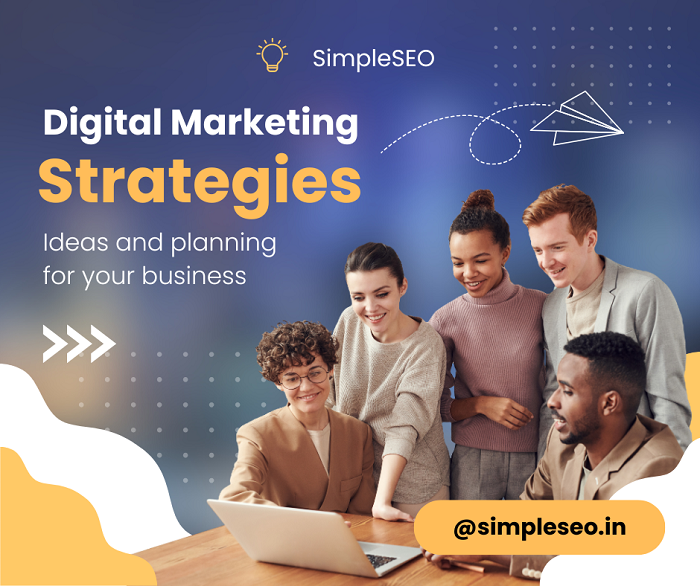
Most Helpful Digital Marketing Strategies to Follow in 2025
Most Helpful Digital Marketing Strategies to Follow in 2025
If you want your business to reach your target audience more efficiently, online marketing is the way to go. The scope of digital marketing across the globe has increased gradually over the years. With the right strategies, you can take your venture to the top rank of Google and other search engines. This is regarded as the metric of success in cyberspace.

Challenges in the Modern-Day Digital Marketing
With the advent of AI and other modern technologies, digital marketing strategies in 2025 have become more advanced. Marketing teams now constantly face the challenge of performing more with less budget. Following the appropriate steps can translate to a better performance and more ROI.
Best Digital Marketing Strategies for the Modern Day
Here are a few strategies that can shape your digital marketing campaigns.
- Maintain the On Page SEO: On Page SEO is the pillar of SEO and it’s the main base to gain the organic position (SERP) and impression. Keep your site secure, updated version, plugins, fast loading, alt tags, meta tags etc. with on page elements.
- Focus on Google My Business: Google My Business is the key success to measure the performance of SEO. It’s directly impact your business to generate calls, website visit, branding etc.
- Go with the Social Media Trends: The use of social media platforms has increased over the years. An average user spends nearly 2 hours and 20 minutes daily across 7 different platforms. The trends are getting modified every week, and as a business, you need to leverage these trends. Invest more in curated content that creates a buzz and becomes relatable with your target audience.
- Take AI Help in Marketing: From conventional to online marketing, you cannot move a step today without AI. Rather than considering it as a competitor, you can regard AI as your collaborator. Give them prompts to create strategies and content, but monitor the quality of the content to avoid monotony.
- Give Importance to Value Content: Generating fresh, curated content can sometimes be a challenge. Here’s where you need to take a decisive step. Creating content is not enough, you must take steps to create quality content that resonates with your audience. Also, ensure that you use the right content at the right time.
With these digital marketing strategies in 2025, you can take your business to newer heights. For better collaboration, contact a trusted partner like Simple SEO. We are among the leading digital marketing agencies in Kolkata, helping businesses reach their target with curated content and specialised marketing techniques. To learn more about us, you can visit our website today.
[bdpp_tmpl layout_id=”923″] -

What Are The Key Benefits Of Digital Marketing Services In 2024?
What Are The Key Benefits Of Digital Marketing Services In 2024?
Ever wondered why more and more businesses are turning towards digital marketing? Well, digital marketing is rapidly growing in popularity owing to its effectiveness at engaging clients and generating leads through accessible means. Seeking digital marketing services is the key to creating a strong online presence for marketing success.
Wondering what makes internet marketing the go-to option for every business? Read on.

Wondering what makes search engine optimisation or SEO so important for your business? Read on.
In recent years, the world of marketing has gradually shifted from traditional marketing like billboards, TV ads and print ads to online marketing. Owing to this shift, there is a strong emphasis on things like SEO, web tracking, email communication and PPC. Regardless of what a company sells, digital marketing works effectively for every industry. What’s more, internet marketing benefits large as well as small and medium businesses by giving access to the wide audience at affordable prices.
Listed below are a few great benefits of seeking digital marketing services!
5 Great Benefits OfDigital Marketing Services For Businesses In The Present Scenario
- Better Conversion Rates: One of the major benefits of digital marketing is that converting a customer online is just some clicks away. Customers no longer have to pick up their phone to make a call or get in the car and drive down to your shop. Thanks to digital marketing, they can just click to learn more about your organisation or directly make a purchase from the comfort of your home. This way, digital marketing paves the way for improved interaction with your target audience.
- Great Flexibility: Consumers nowadays look for a more personalised and custom journey which isn’t possible with traditional marketing, that’s generic by nature. Internet marketing allows you to use the interests as well as preferences of the individuals to tailor the marketing message which they receive. The ability to personalise as per the needs of customers is one of the greatest assets of online marketing.
- Measurable Results: When you seek digital marketing services from a reputed company, you will be provided with reliable, solid reports. These reports show the exact results of the number of people who have clicked a particular link or opened your email. On the other hand, in the case of traditional marketing, there’s no effective way of measuring how many individuals exactly looked at your flyer or your billboard.
- Cost-Efficient: This is another great benefit of choosing internet marketing over the traditional forms of marketing. An effective digital marketing strategy can be easily planned within your budget by using digital marketing which offers an inexpensive technique when compared to the other available advertising channels like TV, radio and more. A well-planned and well-executed digital marketing campaign can reach a wider audience at affordable costs than the conventional forms of marketing.
- Saves Time: Digital marketing is widely preferred by businesses of all sizes since it provides real-time results within no time. Unlike the traditional methods, one can see in real time what’s working and what’s not for online businesses. Through successful digital marketing strategies, you can know about-
- Increase/drop in web traffic
- Conversion rates
- Peak trading times
- Bounce rate
- Number of visitors to your site
- Increase in the number of subscribers
- Brand Building: Brand building is one aspect which every business tries accomplishing and online marketing helps in developing your brand by promoting it in numerous platforms. The more viral the name of your brand goes, the more reputation your brand earns both in the eyes of users as well as search engines.
Now that you are aware of the top benefits, what are you still waiting for? Time to approach a leading digital marketing agency and reap the benefits of their professional services!
Share This Blog
Recent Posts
Know The Importance google Adwords For Business
Why SEO Is Important For Business
7 Important SEO Tips for Small Businesses
Top Benefits of Google Adwords to Grow your Business
What is SEO and How it Works?
What is Digital Marketing & It’s Different Types for your Business?
Know the Importance of SEO for Business
Top 5 Benefits to Choose SEO
What is Search Engine Optimization (SEO)?
How SEO Make You Happy?
Our Services
Services
SEO Services in Kolkata
Local SEO Services
Digital Marketing Services
SMO Services
Website Designing
Important Links
About Us
SEO for Small Business
On Page SEO
OFF Page SEO
Advanced Technical SEO
Portfolio
Blog
Contact Us
Sitemap
-

What is Digital Marketing & It’s Different Types for your Business?
What is Digital Marketing & It’s Different Types for your Business?
Digital marketing is the kind of advertising of any product or service through various online platform or channels like search engines, social media, email and many more. It’s a broad way to promote or advertise your business website or blog throughout digital. There are various types of digital marketing like Search Engine Optimization (SEO), Search Engine Marketing (SEM), Social Media Optimization (SMO), Social Media Marketing (SMM), Email Marketing, Content Marketing and many more.
- Search Engine Optimization (SEO): This is one of important types in digital marketing to promote your website. It helps to improve your website or blog ranking position on search engines like Google and increase the traffic for long term.
- Search Engine Marketing (SEM): SEM is another strong ways to increase traffic from search engine through advertising like Google PPC or Adwords.
- Social Media Optimization (SMO): SMO is the techniques to optimize your business product or service through social media channels like Facebook, Google Plus, Linkedin, Twitter, Pinterest, Youtube etc. To increase brand awareness and promotion.
- Social Media Marketing (SMM): SMM is the process to generate sales, leads, likes, video views, event promotion through various paid advertising like Facebook, Youtube video ad and more.
- Email Marketing: It’s another beneficial ways to increase your product offer, services, discounts, awareness and more through newsletter.
- Content Marketing: Content marketing is the rich techniques and another important type especially for SEO as unique and healthy content plays a significant role for your business website or blog.
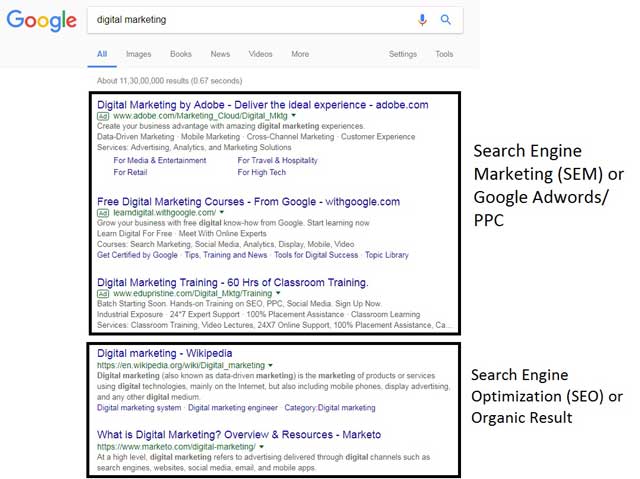
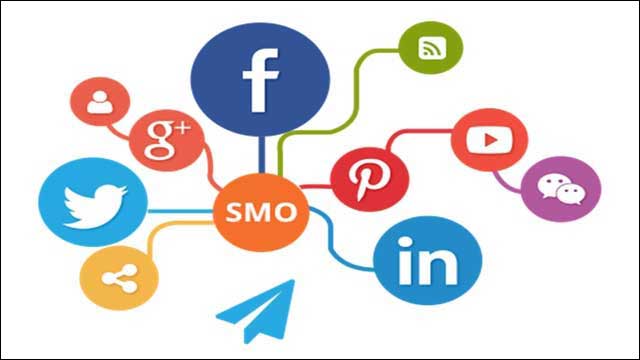
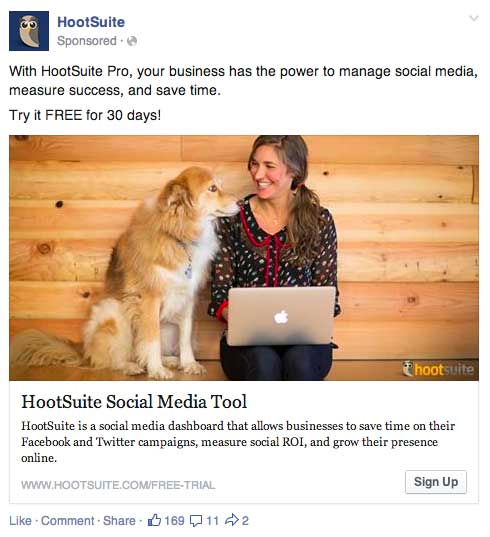
Source: https://en.wikipedia.org/wiki/Digital_marketing
Share This Blog
Recent Posts
Know The Importance google Adwords For Business
Why SEO Is Important For Business
7 Important SEO Tips for Small Businesses
Top Benefits of Google Adwords to Grow your Business
What is SEO and How it Works?
What is Digital Marketing & It’s Different Types for your Business?
Know the Importance of SEO for Business
Top 5 Benefits to Choose SEO
What is Search Engine Optimization (SEO)?
How SEO Make You Happy?
Our Services
Services
SEO Services in Kolkata
Local SEO Services
Digital Marketing Services
SMO Services
Website Designing
Important Links
About Us
SEO for Small Business
On Page SEO
OFF Page SEO
Advanced Technical SEO
Portfolio
Blog
Contact Us
Sitemap